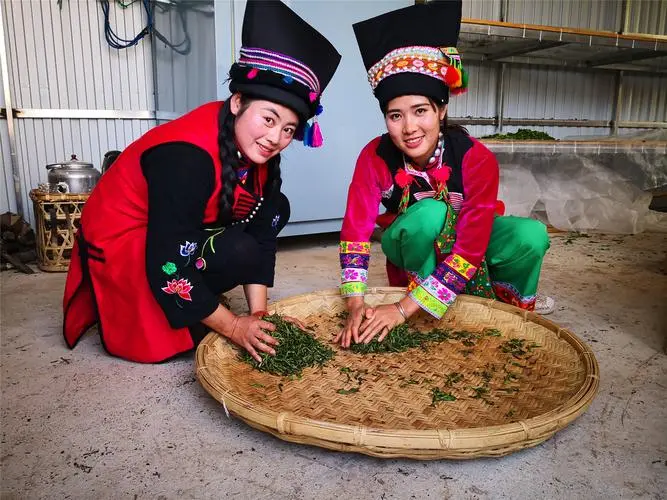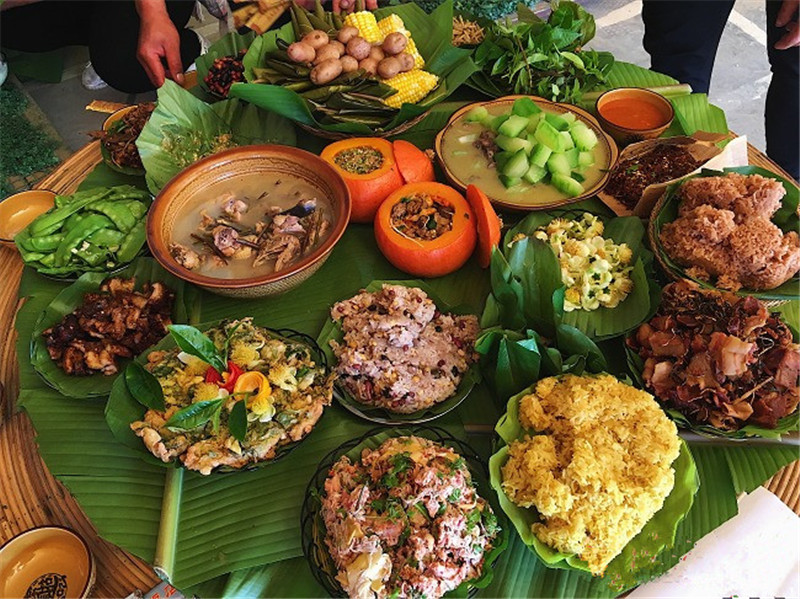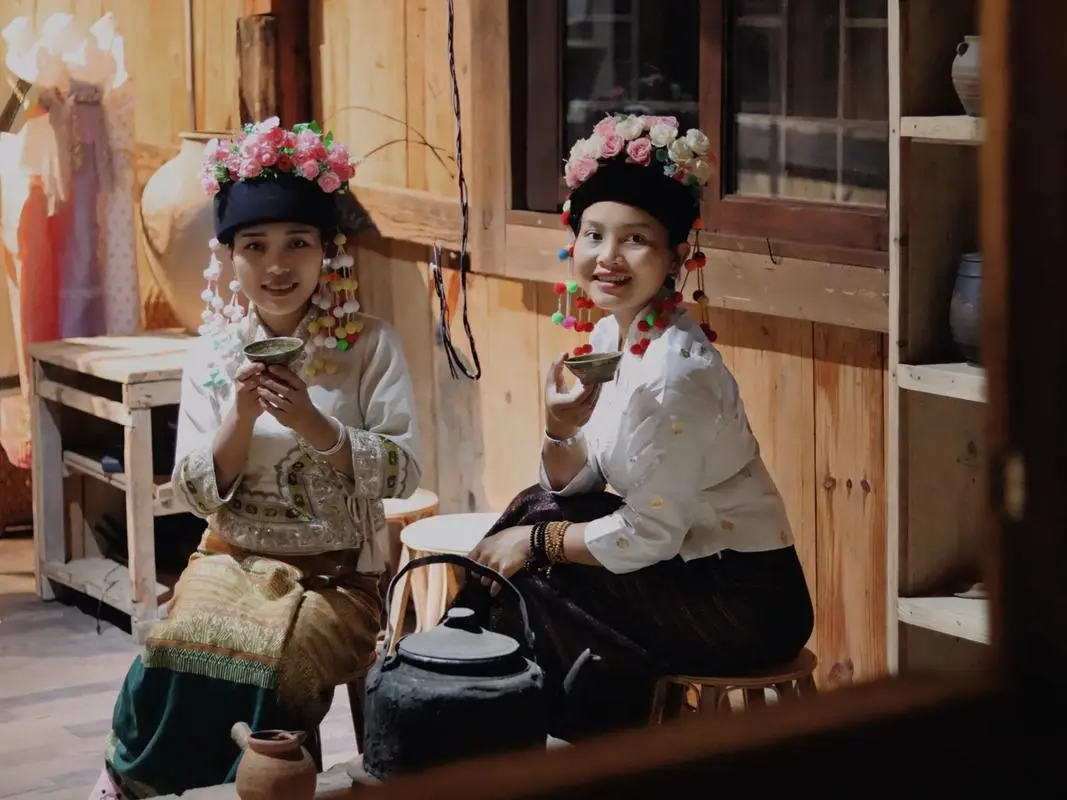
New Rice (Xinmi) Festival of Bulang Ethnic Minority
Chinese Name:布朗族新米节
English Name: New Rice (Xinmi) Festival of Bulang Ethnic Minority
The Bulang people are renowned for their hardworking and simple lifestyles. Over their history, they have developed a unique set of practices for their production and daily life, including tea harvesting and rice cultivation in the mountains and fields of Shuangjiang. After a year of labor—spring planting, summer weeding, and the arrival of golden autumn when the grains ripen and are harvested—every household in the Bulang villages celebrates the New Rice Festival.
Activities of Eating New Rice:
Hakai (Grain Soul Ceremony/哈楷): “Hakai” in the Bulang language means “grain soul” or “grain spirit.” After the grains ripen, a propitious day is chosen to harvest a handful of grain ears, which are brought home and hung at the “batama” (similar to a Han family’s altar). Each household among the Bulang has its own “batama,” a place of worship within the home. Hanging these grain ears, known as the “grain soul,” requires bowing and praying to heavenly gods, Buddha, and ancestors, signifying the harvest’s completion and the spirit’s entry into the home.
Mother of Grains: On the day when the harvested grains are stored in the barns, the host brings back a clump of soil from the fields, divides it into seven parts, and places them atop the grain heap in the barn. This ritual, known as honoring the “Mother of Grains,” involves reciting “Satu” (a prayer for blessing and reverence towards the grains). The Bulang believe that the land is the mother of all things, and by welcoming her into their homes along with the harvested grains, they ensure abundance throughout the year without loss or waste.
Pounding Rice: The Bulang people believe that all things possess spirits, including rice. Historically, they used wooden pounders to process rice, as they believe that grinding or milling rice with machinery would cause pain and lamentation among the rice spirits, cursing the household with poverty and hunger. Instead, they use wooden pestles and mortars, pounding rice with respect and reverence—hands clasped in a gesture of prayer and respect. This way, the rice spirits remain content and ensure a year-round abundance of food in their homes.
Slaughtering Chickens: During the New Rice Festival, it’s customary to slaughter chickens. Chickens are considered not only a delicacy but also symbols of auspiciousness, their crowing heralding dawn and scaring away evil spirits. Before slaughtering, chickens’ feet and heads are washed. Apart from chicken meat, the more diverse the menu, the better.
Ancestral Worship: Before cooking or eating during the festival, no one is allowed to taste food. Once prepared, a bowl of new rice and whole cooked chickens are offered on the “batama” altar. Bowed heads and prayers invite gods, Buddha, and ancestors to partake, blessing the family with health, prosperity, and abundance.
Fire Altar Worship: In Bulang areas, fire altars historically hold significance. Offerings include three leaves of “maliga” fruit tree, folded into “leaf baskets” with bamboo sticks, filled with new rice, cooked rice, and bits of chicken to symbolize offerings to the fire altar deity. Water is dripped as prayers are silently recited, acknowledging fire as sacred and capable of driving away evil spirits.
Water Dropping: A Buddhist activity, after ancestral and fire altar worship, involves taking a pot of new rice and dishes to the temple, praying and chanting with monks. Upon returning home, a feast is prepared.
Prayer before Meals: Once all activities are completed, the entire family and guests gather to enjoy a meal. Before eating, everyone raises their bowls to their foreheads, quietly chanting “Satu.” Elders may recite prayers before the meal, blessing longevity, prosperity, and wealth.
Good Luck Chanting: After the meal, a ritual called “Good Luck Chanting” is conducted, led by elders or religious leaders, praising the year’s harvest and wishing for continued prosperity.
Leftover Rice: A bowl of leftover rice is kept in the cupboard or grain barn for at least a day, symbolizing year-round abundance and prosperity.
Feeding Plow Oxen: Feeding the oxen used for plowing is a significant activity, reflecting gratitude for their assistance in farming and ensuring their well-being.
Plow and Harrow Worship: Simple rituals are performed to honor the plow and harrow, essential tools in agricultural production.
Chicken Bone Divination: Finally, divination with chicken bones concludes the festival, providing guidance and insight for the coming year.
Through the New Rice Festival, we gain deeper insights into the cultural and psychological aspects of the Bulang people, their reverence for ancestors, and their ethical values. This festival encapsulates multiple dimensions of Bulang culture and serves as a crucial focal point for studying and understanding their way of life.

 7 Days GolfingTour
7 Days GolfingTour
 8 Days Group Tour
8 Days Group Tour
 8 Days Yunnan Tour
8 Days Yunnan Tour
 7 Days Shangri La Hiking
7 Days Shangri La Hiking
 11 Days Yunnan Tour
11 Days Yunnan Tour
 6 Days Yuanyang Terraces
6 Days Yuanyang Terraces
 11 Days Yunnan Tour
11 Days Yunnan Tour
 8 Days South Yunnan
8 Days South Yunnan
 7 Days Tea Tour
7 Days Tea Tour
 8 Days Muslim Tour
8 Days Muslim Tour
 12 Days Self-Driving
12 Days Self-Driving
 4 Days Haba Climbing
4 Days Haba Climbing
 Tiger Leaping Gorge
Tiger Leaping Gorge
 Stone Forest
Stone Forest
 Yunnan-Tibet
Yunnan-Tibet
 Hani Rice Terraces
Hani Rice Terraces
 Kunming
Kunming
 Lijiang
Lijiang
 Shangri-la
Shangri-la
 Dali
Dali
 XishuangBanna
XishuangBanna
 Honghe
Honghe
 Kunming
Kunming
 Lijiang
Lijiang
 Shangri-la
Shangri-la
 Yuanyang Rice Terraces
Yuanyang Rice Terraces
 Nujiang
Nujiang
 XishuangBanna
XishuangBanna
 Spring City Golf
Spring City Golf
 Snow Mountain Golf
Snow Mountain Golf
 Stone Mountain Golf
Stone Mountain Golf














